
I tend to be a weather watcher. When you live out in the country, the weather matters. Just about a year ago now, a late October snow storm knocked out the power for several weeks here in Massachusetts. We ended up with several of our adult children returning home with their families until the power was restored, not because we had power but because we’re equipped to manage better without it than most people.
We give a lot of thought to our household systems and have planned ways to decrease our dependence on energy to perform routine tasks. While my kids were home for the October storm, one of the challenges was laundry.
Modern Laundry Takes Lots of Resources
Many people are use to going through several changes of clothes every day. They have clothes for work and clothes for play, clothes to exercise in and clothes to go out to dinner in. There are people who use two towels each time they shower and expect to toss the damp towels in the hamper after each use. When you have a big family that adds up to a lot of laundry.
The first step in managing the laundry is to just create less of it. When I was child we were expected to take off our pajamas in the morning, fold them and put them under our pillow to be worn again in the evening. Our school clothes were hung up as soon as we arrived home in the afternoon and we put on our play clothes. School clothes were never really dirty and play clothes were never really clean. We had one outfit for church and it was kept in pristine condition.

Our socks and underwear were washed out by hand each night and hung to dry on a rack by the parlor stove. Our closets were tiny and we had room to spare because we just didn’t have many clothes.
Cut Down On Laundry By Thinking Smarter
The way laundry was done when I was a child was on my mind during the power outage. For the time everyone was home I assigned each person two towels and they were expected to use them for a full week. I also made it clear that I wasn’t washing anything that wasn’t really dirty. Wet didn’t count. The kids figured out pretty quickly that if they wanted to go out to play wearing dry snowsuits they needed to hang them up as soon as they got inside. There was no handy clothes drier available. The system worked pretty well but eventually, we still needed to do laundry.

This was my opportunity to pull out my Rapid Laundry Washer. I had ordered it months earlier but this was my first opportunity to put it to the test. It looks like a toilet plunger.
I had to reassure my fastidious teen-aged daughter that I wasn’t washing her unmentionables with a plumber’s friend. I filled up a big plastic bin with hot, soapy water and went to town.
One of the terrific things about using any new gadget is that everybody wants a turn. I felt a bit like a duplicitous Tom Sawyer, convincing the children that using the washer was a privilege granted only to the well-behaved.
Their enthusiasm lasted long enough to provide us with clean clothes for the baby and a minimum of things for the rest of us. I didn’t wash work clothes, blue jeans or sheets so this wasn’t a fair test of doing all our laundry this way but it did give me a sense of what it would be like.

The good news is that it took very little soap and a minimum of water to do the job. Both of those things might matter in an emergency. While we still have running hot water when we don’t have power, most people don’t. Conserving water when you have to haul it and heat it is really important.
When we were finished washing we dumped everything in the bathtub, let the water drain, did a through rinse in warm water and found everything was plenty clean. I don’t have a laundry wringer but I do have a mop wringer which worked well enough for squeezing the water from the light load we did.

We have a wonderful, Amish-made clothes rack. We set it up in front of the parlor stove and we had clothes dry and ready to wear in the morning.
The set-up might not have won any decorating awards but it was really efficient. One thing that did occur to me is that in a grid-down situation, the wash and rinse water could have been used for flushing toilets but we didn’t need to do that.
Could we have managed without doing laundry? Sure. But I know I feel better when I feel clean. Keeping spirits and energy up during any emergency is very important. This system isn’t perfect. On my wish list is a Lehman’s Own Hand Washer and their very best hand wringer. Maybe when I get one I’ll give up my electric washer and dryer altogether. Until then, I’m glad to know I can manage when the lights go out.



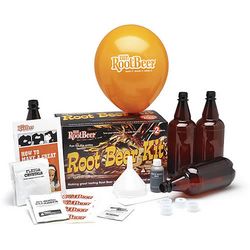





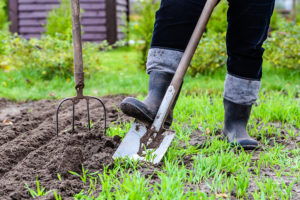







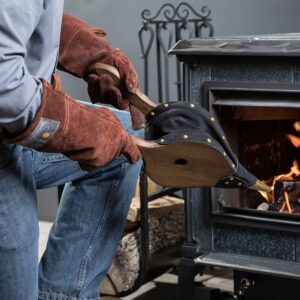

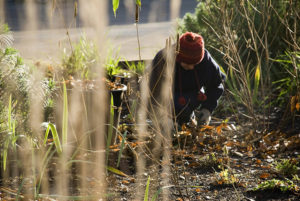



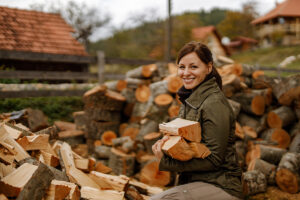








I made a washer out of two 5 gallon buckets an a new plunger when we had no power for over a month and it worked awesome! I still use it when we go camping :)
I have washed many a load in the bathtub and hand starched army fatigues too when my husband was in the military.
Assuming your water isn’t from a well, pumped electrically , and your water heater is gas fired. Otherwise it could be more of a challenge during a power outage. Get out the generator.
I have a plunger washer that works in a 5 gallon bucket for emergencies. I store a bit of washing water and rinse water, but that wouldn’t last me more than one washing.
If I go to apt. I am going to do all of my laundry by hand again using the white plastic washing machine from lehmans. The key is to turn slow so the handle does not break off. If you go real fast it will break but you can repair it by drilling a hole and use a bolt and two rubber washers. I haven’t had hot water for nine months so I am getting used to the idea of roughing it for a while. I do have a new hot water heater but don’t know how to hook it up since I never done that before.
This article sounds like it was taken from my life. I have Lehman’s glass scrub board and often do laundry items by hand. I also have the small wooden floor standing rack for drying clothes.